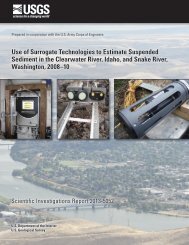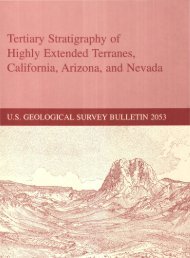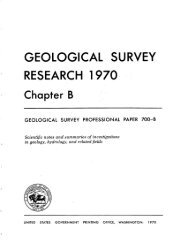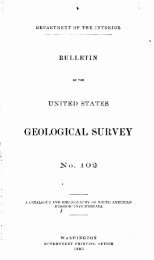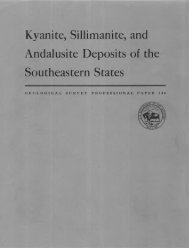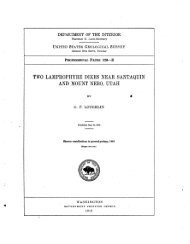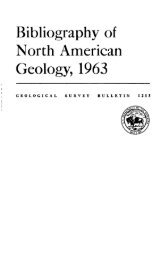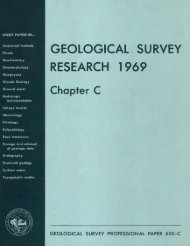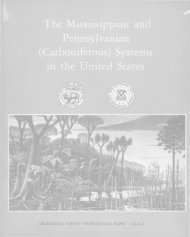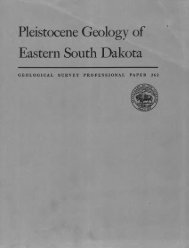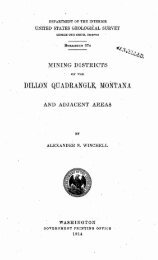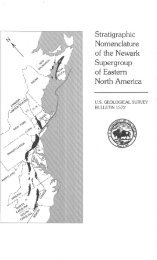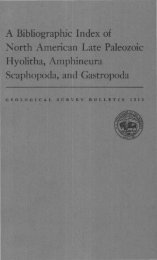GROUND WATER IN NORTH-CENTRAL TENNESSEE
GROUND WATER IN NORTH-CENTRAL TENNESSEE
GROUND WATER IN NORTH-CENTRAL TENNESSEE
Create successful ePaper yourself
Turn your PDF publications into a flip-book with our unique Google optimized e-Paper software.
<strong>IN</strong>TBODUCTION Q<br />
In addition to the works cited above the geologic literature includes<br />
many shorter papers that bear upon the problem at hand. Limita<br />
tions of space preclude a complete tabulation at this place, although<br />
each paper that has contributed to the report is cited by footnote<br />
reference in the text.<br />
Systematic study of the regional ground-water conditions of central<br />
Tennessee has not been attempted heretofore, although some general<br />
and local features have been discussed by Fullerton, 11 Glenn, 12 Nelson, 13<br />
Safford, 14 and Switzer. 16<br />
ACKNOWLEDGMENTS<br />
Adequate investigation of a regional problem such as is discussed<br />
herein would not have been possible unless the well drillers and resi<br />
dents throughout the region had contributed whole-heartedly from<br />
their experience with ground-water conditions. Individual mention<br />
of all who have contributed in this manner is, however, impracticable.<br />
The division of sanitary engineering of the State department of<br />
public health, through H. R. Fullerton, director, granted access to<br />
its files of data pertaining to ground-water supplies for municipali<br />
ties. The division offices of the Nashville, Chattanooga & St. Louis<br />
Railway and of the Louisville & Nashville Railroad, through their<br />
engineers in charge of water supplies, contributed descriptive data<br />
for the wells and springs that they have developed along their respec<br />
tive rights of way.<br />
Margaret D. Foster of the division of quality of water, United<br />
States Geological Survey, and D. F. Farrar, of the division of geology,<br />
Tennessee Department of Education, made the chemical analyses<br />
that form the basis of the discussion of the chemical character of the<br />
ground waters. R. S. Bassler, of the United States National Museum,<br />
described orally the major features of the general geology as a back<br />
ground for the field studies. The Tennessee Division of Geology<br />
contributed half of the funds available for the investigation and in<br />
addition furnished the automobile that was used for transportation<br />
in the field.<br />
» Fullerton, H. R., The water-supply problems of Tennessee: Am. Waterworks Assoc. Jour., vol. 17,<br />
No. 6, pp. 748-750, Jane, 1927.<br />
*» Glenn, L. O., [Notes on the ground-water resources of] Tennessee: U. S. Qeol. Survey Water-Supply<br />
Paper 102, pp. 358-367,1904; [Underground waters of] Tennessee and Kentucky: U. S. Geol. Survey Water-<br />
Supply Paper 114, pp. 198-208,1905.<br />
" Nelson, W. A., Mineral products along the Tennessee Central Railroad: Resources of Tennessee, vol.<br />
3, No. 3, pp. 137-160, Tennessee Qeol. Survey, July, 1913.<br />
« Safford, J. M., Mineral springs [of Tennessee]: Tennessee State Board of Health Bull. 1, suppl., pp.<br />
16-16, October, 1885.<br />
,. W Switzer, J. A., The relation of water supply to health: Resources of Tennessee, vol. 3, M>. 3, pp. 170-;<br />
175, Tennessee Qeol. Survey, July, 1913; vol. 4, No. 1, pp. 3-14, January, 1914s,



